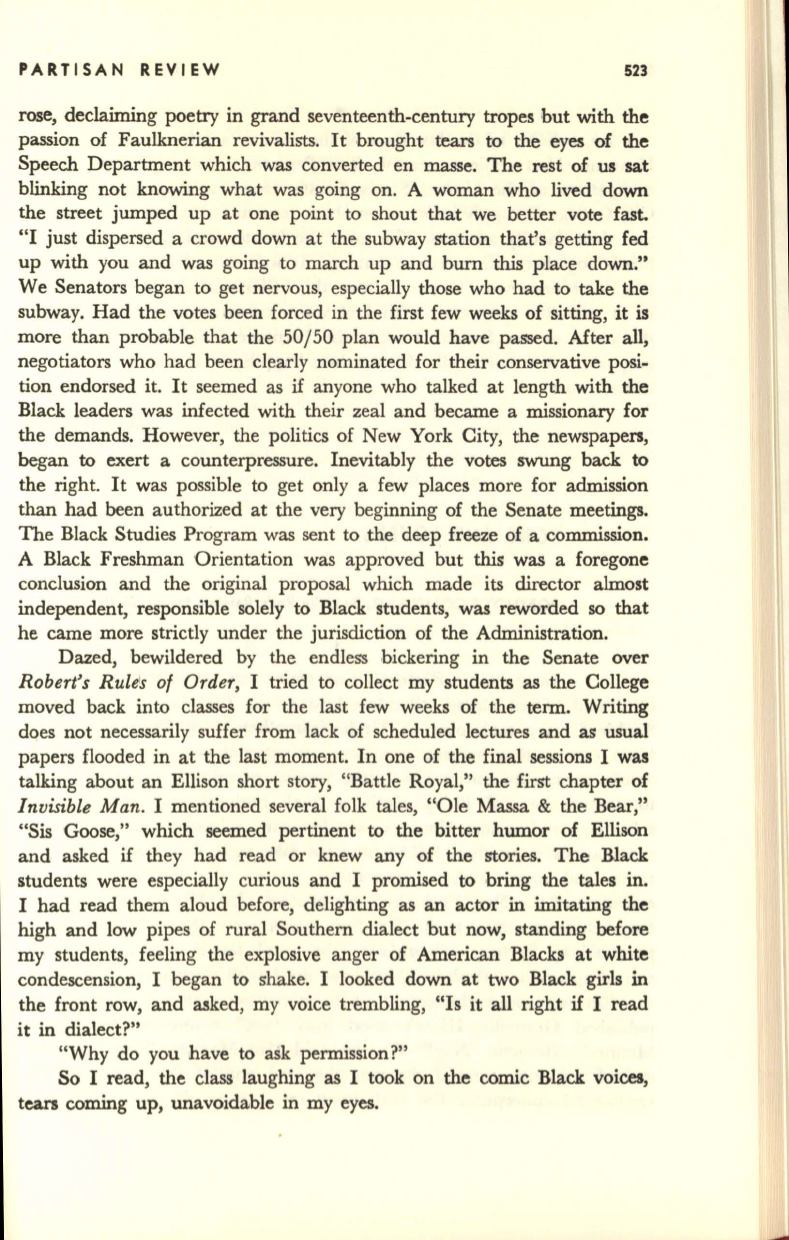
PARTISAN REVIEW
523
rose, declaiming poetry in grand seventeenth-century tropes but with the
passion of Faulknerian revivalists. It brought
tears
to the eyes of the
Speech Department which was converted en masse. The rest of us sat
blinking not knowing what was going on. A woman who lived down
the street jumped up at one point to shout that we better vote fast.
"I just dispersed a crowd down at the subway station that's getting fed
up with you and was going to march up and burn
this
place down."
We Senators began to get nervous, especially those who had to take the
subway. Had the votes been forced in the first few weeks of sitting, it
is
more than probable that the 50/50 plan would have passed. Mter all,
negotiators who had been clearly nominated for their conservative posi–
tion endorsed it.
It
seemed as
if
anyone who talked at length with the
Black leaders was infected with their zeal and became a missionary for
the demands. However, the politics of New York City, the newspapers,
began
to
exert a counterpressure. Inevitably the votes swung back to
the right. It was possible to get only a few places more for admission
than
had been authorized at the very beginning of the Senate meetings.
The Black Studies Program was sent to the deep freeze of a commission.
A Black Freshman Orientation was approved but
this
was a foregone
conclusion and the original proposal which made its director almost
independent, responsible solely to Black students, was reworded so that
he came more strictly under the jurisdiction of the Administration.
Dazed, bewildered by the endless bickering in the Senate over
Robert's Rules of Order,
I tried to collect my students as the College
moved back into classes for the last few weeks of the term. Writing
does not necessarily suffer from lack of scheduled lectures and as usual
papers flooded in at the last moment. In one of the final sessions I was
talking about an Ellison short story, "Battle Royal," the first chapter of
Invisible Man.
I mentioned several folk tales, "Ole
Massa
&
the Bear,"
"Sis Goose," which seemed pertinent
to
the bitter humor of Ellison
and asked
if
they had read or knew any of the stories. The Black
students were especially curious and I promised to bring the tales in.
I had read them aloud before, delighting as an actor
in
imitating the
high and low pipes of rural Southern dialect but now, standing before
my students, feeling the explosive anger of American Blacks at white
condescension, I began to shake. I looked down at two Black girls in
the front row, and asked, my voice trembling,
"Is
it all right
if
I read
it
in
dialect?"
"Why do you have to ask permission?"
So I read, the class laughing as I took on the comic Black voices,
tears coming up, unavoidable in my eyes.


